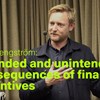intense

Johan Westerman
Johan Westerman is a researcher who obtained his PhD in sociology from the Swedish Institute for Social Research (SOFI) in 2020. His dissertation, entitled Motives Matter, investigated the intrinsic mo
Environmental Co-governance, Legitimacy, and the Quest for Compliance: When and Why is Stakeholder Participation Desirable?
Journal of Environmental Policy and Planning, 18 (3), 306-323. Abstract Deliberative forms of stakeholder participation have been widely embraced as a key measure for addressing legitimacy deficits and
Thomas Hylland Eriksen: Overheating
Overheating. Understanding accelerated change. Thomas Hylland Eriksen, professor at the Department of Social Anthropology, University of Oslo. ABSTRACTThe contemporary world is … too full? Too intense? All of the above, and more. Ours is a world of high-speed modernity where exponential growth can be found in domains as different as the number of cellphones in Africa and the number of international tourist arrivals. The fossil fuel revolution two centuries ago led to the contemporary ‘overheated’ world of exponential growth. The main dilemma of this overheated world is the insight that what was the salvation for humanity for two hundred years, namely fossil fuels, has rapidly become our damnation owing to climate change. This lecture outlines the parameters of ‘overheating’ and describes the main global challenges for our century.
Jonathan Boston: Assessing and Applying the Concept of Anticipatory Governance
Jonathan Boston, Professor of Public Policy, School of Government, Victoria University of Wellington.ABSTRACTFundamental to good governance is the active anticipation, assessment and management of risBased on this analysis, the paper applies the concept to the policy challenges posed by climate change adaptation, particularly sea-level rise. In this regard, humanity is confronted with a slow-motion disaster that will grow progressively in scope and scale, sometimes abruptly. Societies will face significant uncertainty, multiple and compounding risks, immense costs and difficult intertemporal and intragenerational trade-offs. More specifically, rising sea levels will have a major and increasing impact on the built environment in coastal regions. Globally, hundreds of millions of people could be forced this century to relocate from areas at risk from coastal erosion and inundation, higher water tables, and more frequent and intense rainfall events. Mitigating some of the risks and increasing societal resilience via anticipatory, pro-active, prudent and adaptive policy responses will be politically challenging, not least because of the large upfront costs, the likelihood of powerful blocking coalitions, and the complexities of inter-governmental and inter-agency coordination. This paper outlines how, in the interests of sound anticipatory governance, these challenges might be addressed through the creation of new governmental institutions, funding mechanisms and revised planning processes.
Sarah Fine: The outraged conscience of mankind: Asylum, refugees, and a human right to international freedom of movement.
Dr Sarah Fine, Lecturer in Philosophy, King's College London. Abstract Migration is a subject which generates intense debate and disagreement. For example, there is a great deal of debate about whether
Anna Tyllström: The social life of elite students: early socialization tactics in top business education
Venue: Institute for Futures Studies, Holländargatan 13 in Stockholm Research seminar with Anna Tyllström, Associate Professor at Department of Business Studies at Uppsala University and IFFS affiliated

Erik Wengström: Intended and unintended consequences of financial incentives
Erik Wengström, Professor of Economics at Lund University and Distinguished Senior Fellow at Hanken School of Economics / Helsinki Graduate School of Economics. His research focuses primarily on how pe
Intensive Coaching of New Immigrants: An Evaluation Based on Random Program Assignment
Juni 2012. Scandinavaian Journal of Economics, 114:575-600
Research seminar: Erik Wengström - Intended and unintended consequences of financial incentives
Place: Holländargatan 13, Stockholm, or online Research seminar with Erik Wengström, Professor of Economics at Lund University and Distinguished Senior Fellow at Hanken School of Economics / Helsinki Gr
Information dynamics shape the sexual networks of Internet-mediated prostitution
2010. Proc Natl Acad Sci U S A 107:5706-5711. Abstract Like many other social phenomena, prostitution is increasingly coordinated over the Internet. The online behavior affects the offline activity; the r








